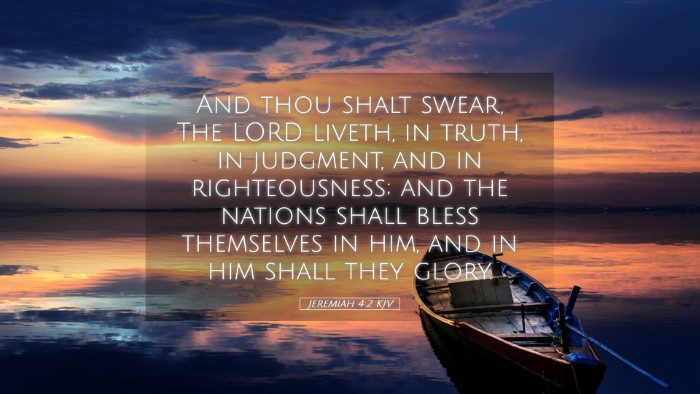Commentary on Jeremiah 4:2
Verse: "And if you will return, O Israel, says the LORD, return to me. And if you will put away your abominations out of my sight, then you shall not be moved."
Introduction
Jeremiah 4:2 stands out as a pivotal call for Israel's repentance, encapsulating themes of restoration, divine mercy, and the conditional nature of God’s favor. This verse comes at a crucial point within the prophetic narrative, where God articulates the path forward for His wayward people. The insights from various public domain commentaries can help unfold the depth of this text.
Theological Significance
Theologians emphasize the profound invitation present in the command to "return." This implies not just a physical return from exile or estrangement but a spiritual realignment with God’s covenant. Matthew Henry, for instance, elucidates that the Lord's call reflects His enduring mercy despite the people's failings.
Exegesis of Key Phrases
- "Return, O Israel":
Here, the term "return" signifies a turning back, pivotal in prophetic literature, highlighting God's desire for reconciliation. Albert Barnes points out that this call denotes both a collective and individual repentance—a return to the covenant relationship.
- "Says the LORD":
This phrase underlines the authority of the message. The divine origin of this call assures the people that it carries weight and urgency, as highlighted by Adam Clarke, emphasizing the importance of recognizing the speaker's authority in Scripture.
- "Put away your abominations":
Henry discusses that "abominations" refer to idolatries and moral corruptions prevailing among the Israelites, which had led them astray. The call to purification is both a practical and spiritual necessity for experiencing God's favor.
- "Out of my sight":
This phrase indicates a need for spiritual cleanliness. Clarke explains that it symbolizes God’s displeasure towards sin; thus, to return to Him necessitates the abandonment of sin that leads to estrangement.
- "Then you shall not be moved":
This promise emphasizes stability and security in God’s presence. Barnes notes that this assurance encourages the faithful that upon their repentance and purification, God will restore and strengthen them, enabling them to withstand adversities.
Understanding Context
The broader context of Jeremiah 4 reveals the prophet addressing a nation on the brink of destruction, much due to their infidelity. This verse emerges as both a warning and an invitation to hope. Commentators like Henry and Clarke agree that understanding this prophetic backdrop is essential for grasping the full import of the text.
The Role of Repentance
Repentance is a central theme in the prophetic literature of the Old Testament. Jeremiah's ministry was marked by appeals for the nation to turn from its wicked ways and seek the Lord. According to Clarke, genuine repentance is not merely an emotional response but involves tangible actions—namely, renouncing sin and returning to the Lord through obedience and worship.
Application for Today
For modern readers, particularly pastors and theologians, Jeremiah 4:2 serves as a reminder of God’s persistent call to humanity. When studying the depths of this text, one can draw multiple applications:
- The Nature of God’s Call:
This scripture highlights God's nature as merciful, calling His people to restoration rather than condemnation.
- The Importance of Response:
It accentuates the necessity of a heartfelt response to God’s invitations—an integral aspect of Christian faith and practice.
- God’s Promises:
The assurance of not being "moved" serves as a foundational truth for believers today, advocating for trust in God's promises amid challenges.
Conclusion
Jeremiah 4:2 is a rich, multi-faceted verse that serves not only as a historical admonition to Israel but also as an enduring message of hope and restoration applicable to believers across generations. Through the exploration of this text, one finds a profound invitation to repentance, a call to discard sin, and the promise that God will sustain those who return to Him. As we engage with this scripture, let it inspire both personal faith and corporate worship, encouraging a return to holiness and steadfastness in God’s presence.


